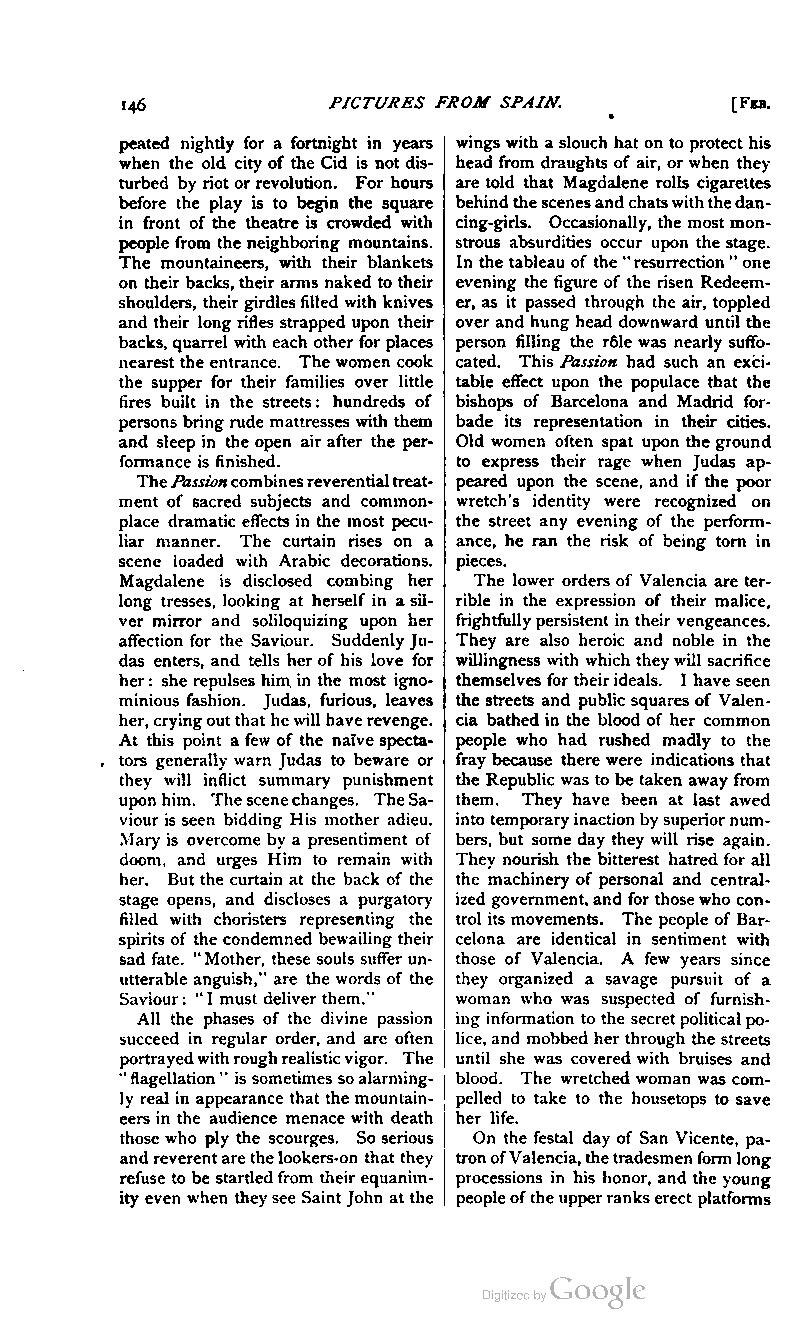peated nightly for a fortnight in years when the old city of the Cid is not disturbed by riot or revolution. For hours before the play is to begin the square in front of the theatre is crowded with people from the neighboring mountains. The mountaineers, with their blankets on their backs, their arms naked to their shoulders, their girdles filled with knives and their long rifles strapped upon their backs, quarrel with each other for places nearest the entrance. The women cook the supper for their families over little fires built in the streets: hundreds of persons bring rude mattresses with them and sleep in the open air after the performance is finished.
The Passion combines reverential treatment of sacred subjects and common-place dramatic effects in the most peculiar manner. The curtain rises on a scene loaded with Arabic decorations. Magdalene is disclosed combing her long tresses, looking at herself in a silver mirror and soliloquizing upon her affection for the Saviour. Suddenly Judas enters, and tells her of his love for her: she repulses him, in the most ignominious fashion. Judas, furious, leaves her, crying out that he will have revenge. At this point a few of the naïve spectators generally warn Judas to beware or they will inflict summary punishment upon him. The scene changes. The Saviour is seen bidding His mother adieu. Mary is overcome by a presentiment of doom, and urges Him to remain with her. But the curtain at the back of the stage opens, and discloses a purgatory filled with choristers representing the spirits of the condemned bewailing their sad fate. "Mother, these souls suffer unutterable anguish," are the words of the Saviour: "I must deliver them."
All the phases of the divine passion succeed in regular order, and are often portrayed with rough realistic vigor. The "flagellation" is sometimes so alarmingly real in appearance that the mountaineers in the audience menace with death those who ply the scourges. So serious and reverent are the lookers-on that they refuse to be startled from their equanimity even when they see Saint John at the wings with a slouch hat on to protect his head from draughts of air, or when they are told that Magdalene rolls cigarettes behind the scenes and chats with the dancing-girls. Occasionally, the most monstrous absurdities occur upon the stage. In the tableau of the "resurrection" one evening the figure of the risen Redeemer, as it passed through the air, toppled over and hung head downward until the person filling the role was nearly suffocated. This Passion had such an excitable effect upon the populace that the bishops of Barcelona and Madrid forbade its representation in their cities. Old women often spat upon the ground to express their rage when Judas appeared upon the scene, and if the poor wretch's identity were recognized on the street any evening of the performance, he ran the risk of being torn in pieces.
The lower orders of Valencia are terrible in the expression of their malice, frightfully persistent in their vengeances. They are also heroic and noble in the willingness with which they will sacrifice themselves for their ideals. I have seen the streets and public squares of Valencia bathed in the blood of her common people who had rushed madly to the fray because there were indications that the Republic was to be taken away from them. They have been at last awed into temporary inaction by superior numbers, but some day they will rise again. They nourish the bitterest hatred for all the machinery of personal and centralized government, and for those who control its movements. The people of Barcelona are identical in sentiment with those of Valencia. A few years since they organized a savage pursuit of a woman who was suspected of furnishing information to the secret political police, and mobbed her through the streets until she was covered with bruises and blood. The wretched woman was compelled to take to the housetops to save her life.
On the festal day of San Vicente, patron of Valencia, the tradesmen form long processions in his honor, and the young people of the upper ranks erect platforms
